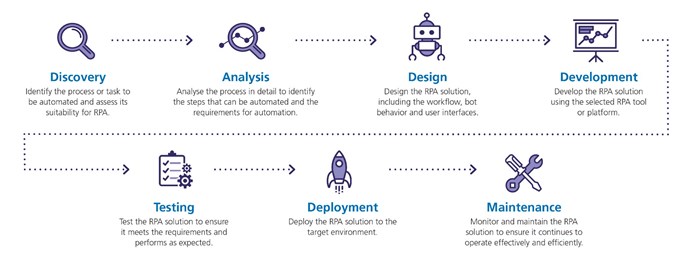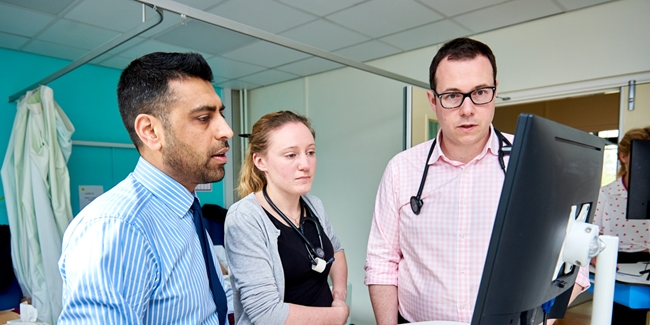Ensuring the efficient and optimal use of NHS resources is a key challenge facing all parts of the health and care system.
Across both clinical and non-clinical roles, NHS staff spend a significant amount of time on administrative tasks. Robotic Process Automation (RPA) is a technology that enables the automation of these administrative tasks where they are repetitive and rule based. RPA software robots, or bots, interact with digital systems and applications to execute tasks such as data entry, manipulation and extraction, form filling and system integration. They can navigate through user interfaces, retrieve and manipulate data, and perform actions based on predefined rules and instructions more quickly and accurately than a human. This frees up staff to focus on value-added activities that require creativity, problem-solving and decision-making.
Arden & GEM’s IT service has an experienced RPA team who are already working with commissioners and providers as a system partner to implement automation solutions that streamline operations, reduce human error and enhance productivity.
Our solution
Arden & GEM provides an end-to-end RPA service that delivers the expertise, tools and processes needed to maximise the potential value of automation in healthcare.
We follow a proven ‘lifecycle’ approach to RPA, working in close partnership with clients at each of the seven stages, to ensure solutions are fit for purpose and deliver the desired benefits.

Our RPA solution has already been successfully applied to password security, dashboards and reporting, finance ledger data, payroll reporting, and managing joiners and leavers.
RPA solutions can be designed and implemented at a national, regional, system or organisational level to improve services and create the capacity for more meaningful work. Within primary care, we are exploring application for blood test results, fit note requests, out of area patients and coding of letters.
The benefits of RPA in healthcare
- Increased efficiency: By automating repetitive and time-consuming tasks, RPA supports staff to work more efficiently so their time is released for higher-value activities.
- Faster processing times: Robots can complete tasks more quickly than humans so that information is available in a responsive and timely manner.
- Enhanced accuracy and compliance: RPA software robots perform tasks with a high level of accuracy, minimising errors and data inconsistencies. This can improve data quality, reduce the risk of mistakes and ensure compliance with regulatory requirements.
- Improved patient and staff experience: Automating administrative processes – such as appointment scheduling and patient registration – can streamline patient interactions resulting in a more positive patient experience while eliminating tedious, manual tasks can also have a positive impact on employee satisfaction.
- Better interoperability: The NHS uses a myriad of systems and applications which don’t always talk to each other as well as needed. RPA can improve integration and data exchange helping information to flow more readily across different departments and organisations.
- Scalability: RPA implementations can be easily scaled up or down to accommodate changing demands and workload fluctuations. While large-scale automation projects have been successfully implemented to achieve significant cost savings within the NHS, with RPA you can start small and scale rapidly.
- Cost savings: By automating manual tasks, NHS organisations can reduce the need for additional staff, reallocate existing resources to more critical areas or deliver direct cost savings.
Why Arden & GEM?
- Our team is experienced in working with NHS systems and processes. We utilise this sector knowledge to help you understand where RPA is appropriate and which solution will work best.
- We are part of a wider network of digital expertise within Arden & GEM’s IT service. Working nationally across systems and functions means we can proactively share solutions, learning and best practice which is not only cost effective but accelerates adoption.
- A multidisciplinary approach. Our 1,000+ strong workforce provides access to a range of professionals with experience in project management, process redesign, stakeholder engagement and evaluation to ensure your RPA implementation is successful.
- We are part of the NHS family. We share your values and put patients before profit.
RELEVANT READING
Find out more about our RPA solutions by reading the items below:
CONTACT US
If you'd like to find out more about RPA, contact us using the form below:









